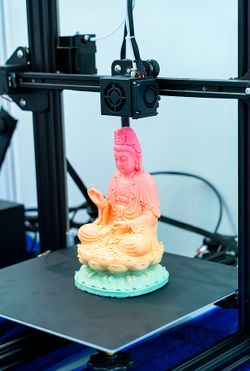Additive Manufacturing (AM) also known as 3D printing is a process of making three dimensional solid objects from a digital file.
In an additive process, an object is created by laying down successive layers of powder material until the object is created. Each of these layers can be seen as a thinly sliced cross-section of the object.
3D printing enables you to produce complex, light and strong shapes using less material than traditional manufacturing methods.
It is possible to use many different materials to create 3D printed objectives, from fabricating jet engine parts to creating chocolate treats and other food items.
Analytical Services with more than 240 years of expertise in metals, ceramics and mineral analysis can determine the chemical composition of most of the powders used in 3D printing technology.
With the use of traditional methods and modern instrumentation, including ICP-OES, ICP-MS, gases analysers and XRF, precise elemental compositions can be reported tailored to the customer's specific needs.
Our Analytical Services department in Sheffield is currently providing chemical composition for the following metallic and ceramic 3D printing powders:
-
Aluminium: e.g. AlSi10Mg, A20X™ (AM205)
-
Cobalt Chrome Alloy: e.g.Co28Cr6Mo
-
Copper Alloy; e.g. pure Cu, CuCrZ
-
Nickel Alloys; e.g. IN718, IN625
-
Stainless Steel; e.g. 316L, 15-5PH
-
Titanium Alloy; e.g. pure Ti, Ti6Al4V
-
Zirconia, Alumina, Silica Carbide and etc.
Enquiries and Technical queries -
Telephone: +44 (0)114 231 2121
analytical@assayoffice.co.uk
